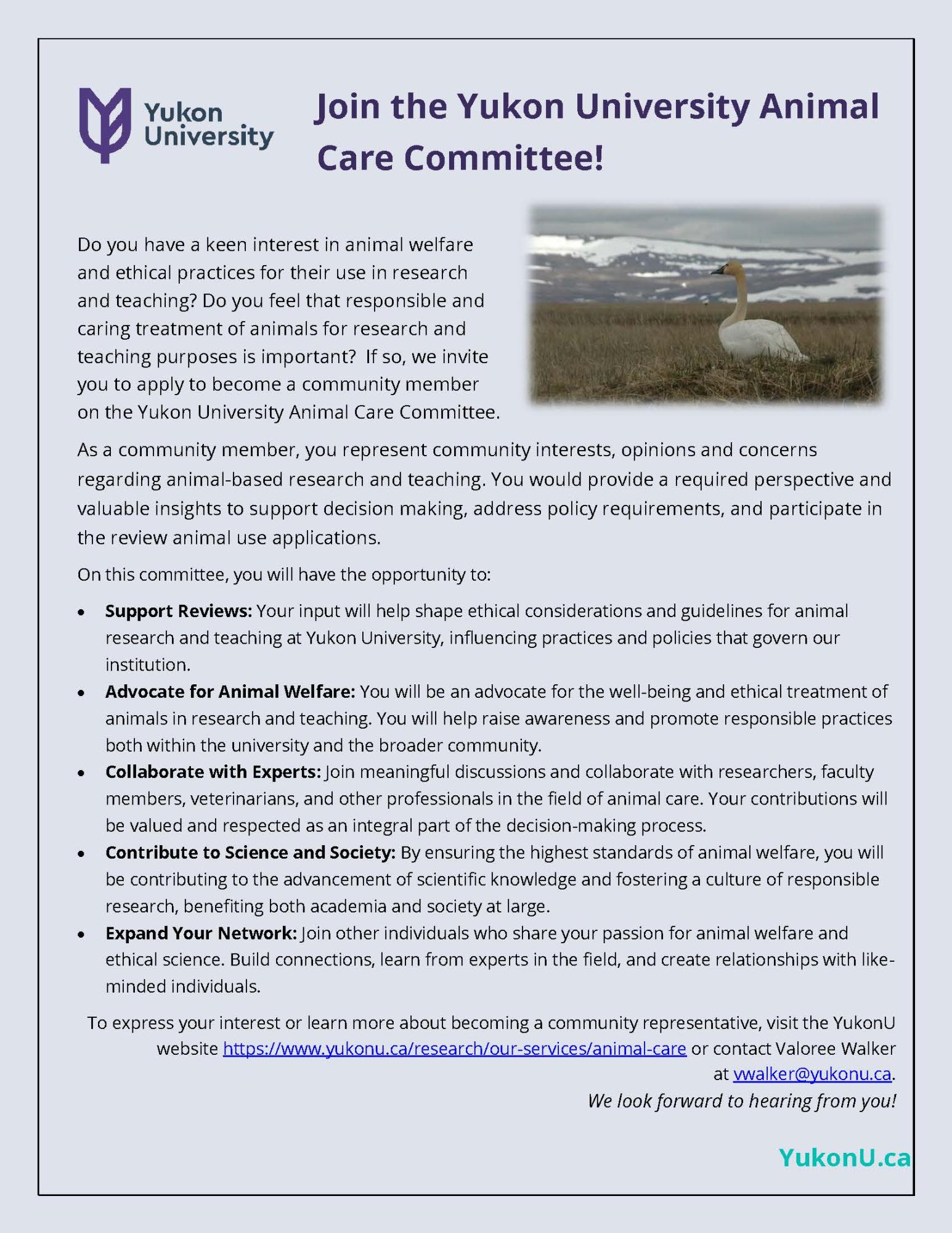Yukon University (YukonU) is committed to providing humane treatment and care of animals in accordance with the standards and principles established by the Canadian Council on Animal Care (CCAC). These standards and principles apply to all faculty, staff, students and affiliates that use of animals in teaching and research.
 Yukon University Animal Care Committee (ACC) is seeking a community member!
Yukon University Animal Care Committee (ACC) is seeking a community member!
The YukonU ACC is currently recruiting for a volunteer member for the community representative position. Your involvement would require a commitment of approximately 1-2 hours/month. The ACC meets 3 to 4 times annually and is responsible for ensuring the ethical use of animals for University research or teaching activities in compliance with the guidelines and policies of the Canadian Council on Animal Care. Meetings are held during regular work hours and are typically 1 – 2 hours in duration. The community representative is to participate actively in decision-making on the care and use of animals, by a) representing community interests, opinions, and concerns regarding animal-based research and teaching activities of YukonU; b) working with the members of YukonU ACC to ensure requirements are followed for animal care and use in research and teaching activities; c) providing an external, community perspective to scientific institutions and the CCAC; and d) helping identify and address the public's opinions and concerns regarding the use of animals for research and teaching. This is a 2-year term with the possibility for renewal. More details about this YukonU volunteer position here or in the Canadian Council on Animal Care "Manual for Community Representatives or contact Valoree Walker, ACC Coordinator at vwalker@yukonu.ca.
If you are a Yukon University or affiliated researcher or instructor, using vertebrates, including fish, as well as certain invertebrates, for any research or teaching purpose, a valid animal care protocol is required.
There are important responsibilities:
- to ensure that good science is conducted
- to meet ethical responsibilities for ensuring that every animal is treated humanely and not subjected to unnecessary pain or distress, and;
- to work within the acceptable standards for experimental animal care and use
The CCAC program is based on scientific peer review, policy making, and responsibility at the institutional level, and they monitor compliance through their assessment program. Yukon University holds the CCAC Certificate of Good Animal Practice, indicating that it is in compliance with these national standards set by the CCAC. For projects funded by NSERC, SSHRC and CIHR, the University also complies with the conditions of the Agreement on the Administration of Agency Grants and Awards by Research Institutions.
Yukon University is certified by the Canadian Council on Animal Care as being in accordance with standards of GAP - Good Animal Practice®. The CCAC assesses the University's animal care and use program every three years. The assessment is done by CCAC panels that include scientists, veterinarians and community representatives. The panel inspects and reviews animal research and any housing facilities with detailed reviews of animal use protocols, veterinarian reports and Animal Care Committee meeting documentation. Yukon University Animal Care and Use program had a virtual assessment conducted on June 8, 2021. As of June 29, 2022, CCAC has certified that the YukonU ethical animal care and use program is in accordance with the standards of GAP-Good Animal Practice®.
The Animal Care Committee (ACC) appointed by, and accountable to, the Vice-Provost, Academic and Research, serves to ensure YukonU meets all regulatory requirements. The ACC conduct ethical reviews and monitors approved animal use protocols for activities involving animals in research and teaching (including field studies).
Activities involving the care and use of animals in research and teaching involve particular health and safety risks not normally encountered in other activities. Individuals working with animals risk exposure to physical, chemical and biological hazards. All animal care and use, including laboratory and field studies require occupational health and safety program.
The degree of risk depends on:
- the nature of contact (direct or indirect) with animals, their tissues, excreta, body fluids, hair, animal cages, dander and
- the species involved
Occupational health and safety guidelines provide information and requirements for working safely with animals in the course of research and teaching.
This information should help you to understand:
- Roles and responsibilities
- Physical Hazards associated with animal care and use
- Animal behaviour and ways animals react or defend themselves, if a procedure causes pain, or they perceive their safety to be threatened;
- Relevant aspects of safe handling and performance of manipulations;
- Procedure for reporting animal related injuries;
- Proper waste disposal procedures;
- Zoonoses - recognize examples of animal infections that can be transmitted to humans;
Mandatory training is required for anyone planning activities involving animals for research and teaching. This training includes a module addressing health and safety requirements.
